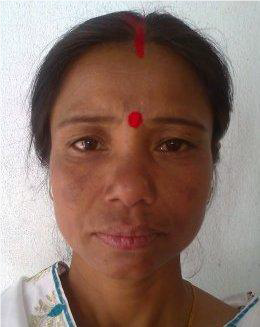Rina Kakoti hails from an impoverished family in Gopalpur Village, Swaman Block. She is married to Biren Kakoti, who works in the bamboo business alongside kerosene distribution. They have three children. Rina has studied until Grade X and has been trained in papad making and agarbatti (incense stick) making. She worked only from home and seldom stepped out.
In 2013, Rina joined Kokila Vikas Ashram (KVA), a member organization of SEWA that is into the garment industry. Shortly after joining the organization, she went to SEWA Ahmedabad for a leadership training where participants were to be groomed as Master Trainer.
After the training, Rina’s confidence was boosted and when she came back to her village, she started visiting other villages and interacted with women to gain an understanding of their problems and also to proactively provide practical solutions, if possible.
Rina’s journey from being a shy, reserved woman to a confident Agewaan (leader) and Master Trainer is an inspiration for her entire community.
“KVA has added colours of happiness and success in my life,” Rina says.
Established in 1986, the Kokila Vikas Ashram (KVA) operates on the lines of Gandhian principles and values on rural development, livelihood opportunities, employment generation and self-reliance. The organization aims socio-economic transformation by creating awareness, capacity building, organizing the rural people, skills training of youth and women, and educating the children. KVA works in Gahpur Sub Division of Sonitpur Districts and focuses on the empowerment of the Boro Tribal Community living in the North Bank of Bhramaputra. KVA is one of the farmer organizations under the MTCP2 Programme in India.
SEWA is a member of the Asian Farmers’ Association and is also the national implementing agency of MTCP2 Programme in India.
About MTCP2
The Medium Term Cooperation Program Phase 2 (MTCP2), a five-year capacity building program supported by the International Fund for Agricultural Development (IFAD), the Swiss Agency for Development and Cooperation (SDC), and the European Union (EU), has been implemented in 19 countries across three sub-regions—Southeast Asia, South Asia, and the Pacific—engaging 1,544 sub-national farmers organizations (FOs) with a total membership of around 22 million farmers. The funding support (total budget of $ 5 million for the whole duration of the project across 19 countries) serves as a catalytic fund that will allow FOs to enhance their capacity to be effective channels of economic services to farmers. So far, the program has contributed to the formation of strong national platform of FOs with improved capacity to engage in policy processes and mobilize resources from mainstream agricultural development programs like extension services, credit, and pre and post harvest facilities. The program also helped in transforming farmers associations into commodity-based cooperatives to strengthen the role of small-scale farmers within an inclusive and sustainable value-chain. The program is being implemented by the consortium Asian Farmers’ Association for Sustainable Rural Development (AFA) and La Via Campesina (LVC).




Comments are closed